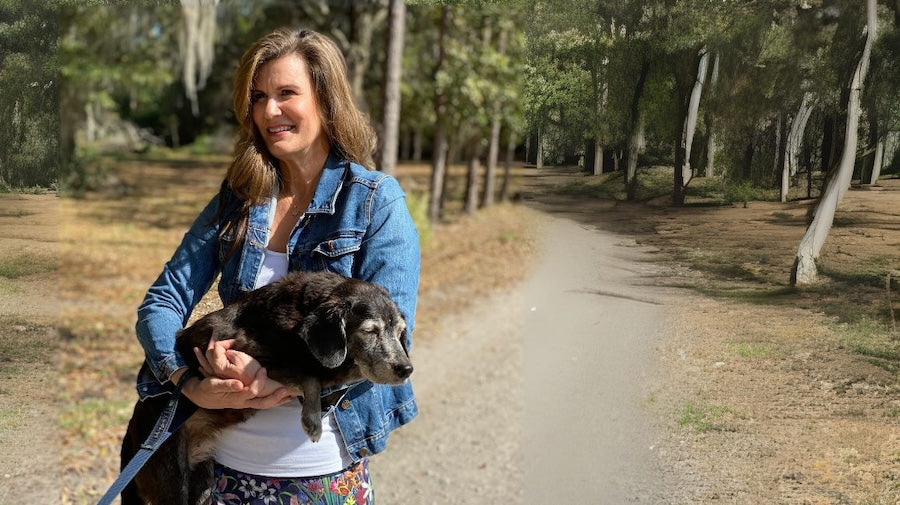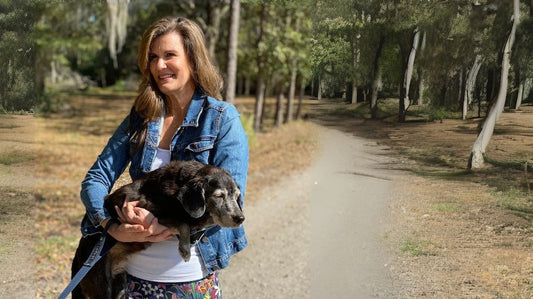The MycoDog Senior Dog Study is one of the first veterinary research projects of its kind to look at natural ways to support the brain health and quality of life of aging dogs. Noticeable signs of cognitive decline are present in about one in four dogs by age 11, and in more than two-thirds of dogs by age 15, making it one of the biggest challenges families face in those golden years. Our goal was simple: to better understand how a mushroom and adaptogen blend for senior dogs could help them stay more connected, comfortable, and engaged as they age.


What is the Senior Dog Study?
This proof-of-concept clinical study was designed and run under the supervision of veterinarian and veterinary researcher Dr. Joel Ehrenzweig, DVM, MRCVS, with study coordination by Carter Easler, Director of Education for MycoDog.
The study set out to evaluate how a mushroom extract and adaptogen formula, specifically MycoDog Clarity, might support aging dogs showing signs of cognitive decline. Over several months, participating senior dogs received Clarity daily, while their families and veterinarians tracked changes in behavior, activity, and overall well-being.
This was not just a survey or an informal collection of case studies. The Senior Dog Study was designed as a structured clinical veterinary research project, blending family observations with in-clinic data to show, for the first time, how natural support like Clarity can make a measurable difference for senior dogs.

Senior Dog Study: Collecting the Data
The Senior Dog Study collected both objective data (collar activity and sleep tracking, in-clinic measurements, and caregiver surveys) and subjective observations from pet parents. Together, this combined data provided a comprehensive look at how mushrooms and adaptogens may support senior dogs’ health and engagement.
The study used a 0–64 behavior scoring system, based on validated DISHAA survey criteria. The DISHAA acronym is a diagnostic tool used by veterinarians to assess the behavioral changes in dogs that may indicate cognitive decline. The DISHAA criteria assesses age-related behaviors like disorientation, difficulty recognizing people, forgetting commands, decreased interaction, nighttime restlessness, pacing, staring, and reduced playfulness. A higher score means more of these behaviors, while a lower score means fewer or milder occurrences of these behaviors, so a drop in score over the course of the study is a sign of improvement.
The collars were especially valuable in collecting objective data throughout the course of the study. For example, the collar data tracked when a dog was pacing at night versus resting, or whether daytime activity was steady or fragmented. This provided measurable proof that aligned with the changes being noticed by families, like more consistent sleep, less nighttime restlessness, and healthier activity levels during the day.
In addition to behavior and collar data, the study measured biomarkers like CRP (an inflammation marker) and BDNF (linked to brain health). While preliminary and variable, these shifts aligned with observed behavioral improvements from pet parents. See the full published Senior Dog Study to learn more about how we tracked the data.

Senior Dog Study Key Findings
What mattered most from the Senior Dog Study weren’t just the numbers, but the clear patterns that emerged across the group. Across sleep, activity levels, and behavior scoring, most senior dogs showed meaningful improvements that made day-to-day life easier for both the dogs and their families.
Here are some highlights from the Senior Dog Study:
- Better Sleep & Nighttime Behavior: Several dogs who used to pace or wake their families multiple times a night began sleeping longer stretches. Collar data confirmed that many dogs experienced improved nighttime rest, with fewer sleep interruptions.
- More Daytime Engagement: Pet parents reported dogs showing renewed interest in their surroundings, and in playing with toys and family members. Caregivers said their senior dogs were more alert, recognized them and members of the family more readily, and were eager to interact again. Some dogs even returned to greeting their families at the door.
- Improved Activity Levels: Collar data showed more consistent daytime activity, as well as fewer rest interruptions at night, indicating most dogs in the study experienced not only better sleep but also healthier activity levels throughout the day.
- Biomarker Results: In a subset of dogs, CRP (an inflammation marker) trended downward and BDNF (a neurotrophic factor) trended upward, aligning with reported behavioral improvements. While preliminary, findings like these suggest Clarity may support inflammatory balance and brain resilience in aging dogs.
- Positive Overall Trend: While results varied, most participants either improved (59%) or stabilized (23%). When it comes to progressive behaviors associated with cognitive decline in senior dogs, even stabilization is considered a meaningful win.
- Stage-Dependent Results: Improvements were most pronounced in dogs in the moderate group, where several senior dogs achieved double-digit score reductions. In this scoring system, even a 5-point drop can mean a real improvement in daily life for senior dogs and their families.
- Most Responsive Behaviors: Disorientation, pacing, nighttime restlessness, and reduced interaction with family were the symptoms most likely to improve over the course of the Senior Dog Study.

Real Stories from the Study Dogs
What really brings this important research to life are the positive changes in the quality of life of these senior dogs and their families.
Pet parent feedback was collected alongside the survey scores and the collar data, giving a fuller picture of what these dogs were experiencing over the course of the study.
Here are a few examples of how our senior dogs in the mild, moderate, and severe groups responded during the study:
- Baby (Pitbull, 10 yrs old, Severe group): Starting with a score of 35 in the severe group, Baby experienced the largest score reduction, with a 25-point improvement to a score of 10, and a noticeable boost in alertness, playfulness, and nighttime rest.
- Billie (Tibetan Terrier, 16 yrs old, Severe Group): Billie began the study at a 42, and improved to 19, a 23-point improvement. His collar data confirmed longer rest periods and increased structured activity. His family also described him as “more present.”
- Chloe (Beagle, 16 yrs old, Severe Group): Chloe entered with a score of 44 and improved by 8 points, to 36 during the study. with calmer sleep patterns and more interest in her surroundings. Her caregivers noticed she was “more engaged with the household”.
- Annie (Golden Retriever, 11 yrs old, Moderate group): Annie’s score improved from 22 to 12, a 10-point change. Her collar showed better sleep efficiency, and her owners also reported fewer pacing episodes and better rest.
- Jessie (Rhodesian Ridgeback, 13 yrs old, Moderate group): Jessie’s score improved from 23 to 4, a 19-point change. Her owner described a “remarkable turnaround” in alertness.
- Mozart (Bichon-Poodle mix, 17 yrs old, Moderate group): Mozart’s score dropped from 34 to 25 during the study, with his owners reporting “more good days” and his collar confirming steadier activity patterns.
- Noah (Maltese, 16 yrs old, Mild group): Noah’s night awakenings were cut in half, from 20 per night to 10, giving both him and his family more peaceful nights. Owners also reported he “seems like his old self again.”
- Fat Macc (Mixed breed, Mild Group): Improved from 10 to 5, and then down to 2. His case shows how even mild-stage dogs may benefit from early support that helps slow progression and further decline. Fat Macc’s owners also reported greater enthusiasm at meal times and fewer pacing episodes.
Beyond the data, the changes families described show how natural support can ease daily challenges and restore treasured routines. See more of the dogs' stories from the Senior Dog Study.

Safe and Easy Natural Support for Senior Dogs with MycoDog Clarity
Want to learn more about the formula used in the Senior Dog Study? MycoDog Clarity is a blend of natural adaptogens and mushroom extracts from wild-harvested and naturally cultivated mushrooms, grown in nature. Clarity includes a spagyric, dual extraction of the fruiting bodies of Lion’s Mane, Reishi, and Cordyceps, along with Bacopa Monnieri and Ashwagandha, formulated to support cognitive function, emotional balance, and nervous system health in dogs.
One of the most encouraging findings from the Senior Dog Study was how well MycoDog Clarity was tolerated by all of the senior dogs, even those with other health challenges. Throughout the study, no supplement-related adverse events were reported. Caregivers consistently said their senior dogs accepted Clarity willingly and that it was easy to give as part of their daily routine.
This matters because many aging dogs are already taking medications or have a reduced appetite, something we know just makes it harder for families to stick with a long-term supplement plan. The fact that Clarity was both safe and highly palatable means it can fit into your senior dog’s daily routine without adding stress for you or your dog.
Many medications can bring side effects like stomach upset or drowsiness. In contrast, this natural approach gave families a safe option they can try with confidence.
What This Means for Your Senior Dog
Cognitive decline affects nearly 30% of dogs by age 11 and more than two-thirds by age 15. For many families, the confusion, restlessness, reduced interaction, these age-related behavioral changes are heartbreaking. The Senior Dog Study shows that natural interventions like mushrooms & adaptogens may help.
The Senior Dog Study offers hope for families facing the challenges of caring for their aging dogs. By combining properly sourced, extracted and formulated natural mushrooms and adaptogens for senior dogs and careful data tracking, this study showed hope for a brighter future for senior dogs.
If you’d like to dive deeper into the science, you can read the full published Senior Dog Study.
If you think your senior dog could be a good candidate for future phases of this research, click here to see if they’re a fit and join our email list for updates. Together, we can keep learning and keep giving senior dogs the joyful, connected golden years they deserve.
About Angela Ardolino

Angela Ardolino, a certified cannabis and fungi clinician, brings over 20 years of expertise to the field of holistic pet wellness. As a graduate of the inaugural Medical Cannabis for Therapeutic Use program at the University of Vermont School of Medicine, she is a passionate advocate for safe, natural, and ethically-grown whole plant and fungi medicine tailored for pets.
Committed to the highest standards, Angela continues to educate and inspire pet parents through her popular podcast, Your Natural Dog, where she hosts experts to discuss holistic pet care, natural remedies, nutrition, and training. Follow Angela Ardolino on Facebook, Instagram, TikTok, and YouTube to stay updated on her mission to educate and empower pet parents everywhere.




